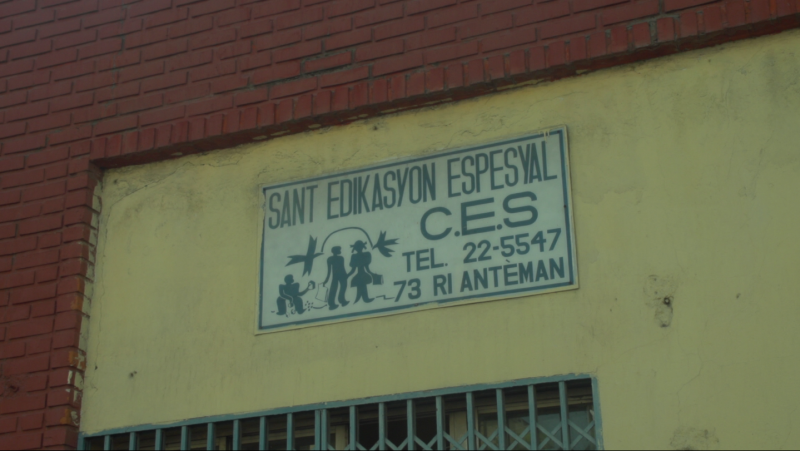
特別支援教育センター(CES)の看板。レナ・ジャクソンによる写真は掲載許可済み。
ハイチでは、障害を持って生まれた子供50人のうち、学校に通えるのはわずか1人である。理由の1つに、障害者への特別支援教育の費用が高額に設定されていることが考えられる。首都ポルトープランスにある CES は、発達障害のある子供たちにハイチでは唯一無償で教育を行っている学校なのだ。
特別支援教育において授業料を免除したのはハイチの中でもCESだけだが、このままではいけない。CESとその仕事を題材にした映画を制作してほしいと依頼があったとき、映画監督のレナ・ジャクソン と彼女の仕事仲間であるローワン・ムーア・ゲレティーを決断させたのは、ハイチの現状だった。グローバル・ボイスは短編映画の制作から得た経験について2人にインタビューをした。
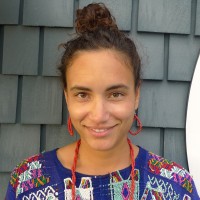
映画監督レナ・ジャクソン。写真は掲載許可済み。
グローバル・ボイス(以下、GV):ご自身の経歴について簡単に話していただけますか?
Lena Jackson (LJ): I'm an independent filmmaker and teacher. I've traveled to Haiti, India, Guatemala, Cuba and Zimbabwe working on videos for Fusion, Medium, PBS's EarthFix, Nomadic Wax, Sesame Workshop India, Cultural Survival, and Cuba Skate. I have a B.Sc. in Foreign Service from Georgetown University and an M.A. in documentary film from the University of California, Santa Cruz.
レナ・ジャクソン(以下、LJ): 私はフリーの映画監督であり、教師でもあります。「フュージョン」 「ミディアム」、PBSテレビの「アースフィックス」や「ノマディック・ワックス」 、 「セサミ・ワークショップ・インディア」「カルチュラル・サバイバル」「キューバ・スケート」に投稿する動画撮影のために、ハイチ、インド、グアテマラ、キューバ、ジンバブエを旅していました。ジョージタウン大学の国際関係学を専攻し学士号を取得しました。サンタクルーズのカリフォルニア大学にも行きドキュメンタリー映画学の修士号も取得しています。
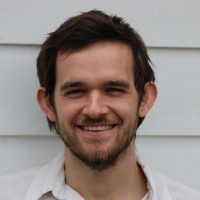
ローワン・ムーア・ゲレティー。写真は掲載許可済み。
Rowan Moore Gerety (RMG): I'm the Yakima reporter for Northwest Public Radio. Before that, I used to be a news reporter for KAZU, the NPR station in Monterey Bay, as well as a regular contributor to Marketplace. I've written for The Atlantic, Slate, Foreign Policy, Guernica, Courrier International, The Christian Science Monitor, and The Common, and produced radio stories for All Things Considered, Latino USA, Only a Game, Living on Earth, and The California Report. I was the launch editor for the African Makers series on Medium, a collection of writing about creativity in business and social welfare around Africa. I studied anthropology at Columbia University, was a 2011-2012 Fulbright Scholar in Mozambique, a 2013 International Reporting Project (IRP) fellow in Nigeria, and received a 2013 Jon Davidoff scholarship at the Wesleyan Writers Conference. I'm interested in inequality and economics in the developing world, as well as religion, housing, and global migration.
ローワン・ムーア・ゲレティー(以下、RMG): ノースウエスト・パブリック・ラジオに勤めるヤキマ出身の記者です。その前は、「マーケットプレイス」 へ定期的に寄稿し、さらにはモントレー湾岸にあるNPR中継局の「KAZU(カズ)」の報道記者をしていました。「ザ・アトランティック」「スレート」「フォーリン・ポリシー」「ゲルニカ」「クーリエ・インターナショナル」「ザ・クリスチャン・サイエンス・モニター」 「ザ・コモン」にも記事が掲載されました。それに、「オール・シングス・コンシダード」「ラティノUSA」「オンリー・ア・ゲーム」「リビング・オン・アース」「ザ・カリフォルニア・リポート」でのラジオ番組をプロデュースしていました。ブログサービス「ミディアム」の「アフリカン・メーカーズ」 立ち上げに、私は編集者として携わりました。このシリーズは、アフリカにおけるビジネスや社会福祉の創造性についてまとめたものです。 コロンビア大学で人類学を学び、2011年から2012年はモザンビークでフルブライト奨学生として、2013年はナイジェリアで国際報道プロジェクト(IRP)のメンバーとして働き、ウェズリアン大学で行われたライター会議で2013年度ジョン・ダビドフ奨学金をもらいました。発展途上国にある不平等な風潮や経済状況だけでなく、宗教や住居、そして移民のグローバル化にも関心があります。
GV:CESはどうやって知ったのですか? また、どうしてこの映画を作ることにしたのですか?
LJ: I met the director of CES through a good friend who is Haitian-American. I visited CES in 2010 soon after the earthquake while it was housed in a temporary building. On another visit to Haiti, the director, Maryse Jean-Jacques, asked me to make a film to help spread the word about the programme and the challenges facing children with developmental disabilities in Haiti.
LJ: ハイチ系アメリカ人の友人を通して、CESの所長と出会いました。2010年、ハイチ地震のすぐ後、CESが仮設の施設に移っていた期間に私はそこを訪れました。 また別の機会にハイチを訪れた際には、所長のマリーズ・ジャン=ジャックに、映画を作ってほしいと頼まれました。発達障害を持つ子供たちがCESで学習し様々なことに挑戦している姿を、世界の人に知ってもらいたいとのことでした。
GV: CESはポルトープランスにある唯一の国の施設であり、貧しい家庭に生まれた障害のある子供たちをサポートすることを目的として建設されたようですね。ではなぜ、入学希望者が増えてきているのでしょうか?
RMG: There are a great many services — from access to safe drinking water and sanitation to healthcare and job training — that are unavailable for the large majority of people in Port-au-Prince.
Port-au-Prince is a difficult place to navigate and get things done, even (or especially!) for Haitians. Trying to educate children with special needs poses an additional challenge because, as is the case in most of the world, there is widespread stigma about developmental disabilities that sometimes extends even to teachers and parents.
RMG: サービスが充実しているからでしょうね。例えば、飲み水や衛生面における安全性の確保から、医療や職業訓練にいたるまで様々です。これらのサービスはポルトープランスのほとんどの人々が受けることができません。
ハイチの人々でも(というよりハイチの人こそが)、ポルトープランスをあまりよく知らず、何もできない場所です。特別な支援が必要な子供たちに教育を受けさせようとすると、また問題がでてきます。ほぼ全世界で発達障害に関する偏見が広がり、ときに教師や両親にまでその偏見が及ぶことがあります。
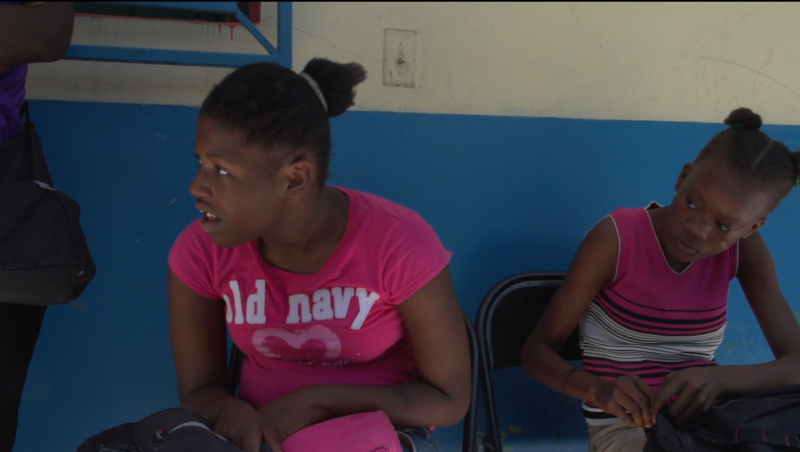
廊下にいる女の子たち。監督のご厚意により許可を得て掲載。
GV: CESの使命は何ですか? また、それを果たすためにスタッフはどんなことをしていますか? 郊外に分校はありますか? 他のNGO団体との協力体制は?
LJ: CES’ long-term goal is inclusion of children with developmental disabilities in the mainstream school system. To this end, they have trained teachers and staff at a number of schools in other parts of the city and beyond to work with former CES students wherever possible. After losing their building and some funding in the 2010 earthquake, however, they have had to curtail some of this work to focus on rebuilding their core programs: the school and diagnostic clinic in Port-au-Prince. That said, when we visited, it was obvious that people from around the country relied on their services: we met visiting mothers from as far away as Jérémie, an eight-hour bus ride from PAP. CES also works with a troupe of clowns, Les Reskapés (featured in the film), trained by Clowns without Borders, to promote self-esteem and confidence in social situations among their students.
LJ:CESが定める長期的な目標は、発達障害がある子供たちを普通のクラスで授業を受けられるようにすることです。そのために、街に数ある学校の教師やスタッフ、さらには仕事の垣根を越えて、過去にCESに通っていた生徒を様々な場所から集め、研修を行ってきました。しかし、2010年の地震により建物も資金も失った後、学校と診断専門の診療所を再建するという本来の計画を優先するため、こういった活動を控えていかなければならなくなりました。というのも、私たちが訪れたとき、明らかに国民がCESのサービスを信頼していると感じました。例えば、ポルトープランスからバスで8時間も離れているジェレミーから来ている母親もいます。他にもCESは、生徒たちが社会の一員であるといった自尊心や自信を持てるよう国境なきピエロ団から訓練を受けたサーカス団、レ・レスカペ(劇中に登場シーンあり)と一緒に活動をしています。
GV: CESが考える「知的障害」の定義とは? 入学の手続きはどのようになっているのですか? 何か支払う必要があるのか、それとも無料ですか?
RMG: We don’t know the exact criteria CES considers in determining whether children have a developmental disability. The way it was explained to us is that spots in the CES school are reserved for children with the most acute needs. Families begin by visiting the clinic attached to the school, where a doctor, physical therapist, and speech pathologist conduct intake visits. Many families whose children are not enrolled in the school still visit the clinic regularly for diagnostics and physical therapy. The school is free; there are nominal fees for some of the medical services to offset the costs of hiring an outside doctor.
RMG:発達障害の有無を決めるうえでCESが定める明確な基準はありません。僕たちが知る限り、CESでは最も切実にサポートを求めている子供のために席が確保されています。家族はまず、学校に併設されたクリニックに行きます。ここでは、医者、理学療法士、言語療法士に対して子供の状況を説明します。子供を学校に通わせてやれない家族も、診察や理学療法を受けるためそのクリニックを定期的に訪れています。学費は無料です。ただし、外部医師の人件費がかかるため、診察を受ける際は小額の受診料が発生する場合もあります。
GV: 障害のある子供がいるがゆえに、先ほど話に出てきたような家族が貧しい環境が連鎖しそこから抜け出せない理由を説明してください。
RMG: Only 1 in 50 Haitian children with disabilities attend [sic] school. This is a tremendous setback both for the children who stay home, and for parents who might otherwise be out working. Being excluded from school both reinforces the common perception that children with disabilities are a burden, and deprives them of the opportunity to develop useful skills that could help them earn a livelihood. Several former students at CES now work in maintenance/cleaning there, and told us of the difficulty of finding jobs elsewhere.
RMG: ハイチでは、障害を持って生まれた子供50人のうち、学校に通えるのはわずか1人です。この状況は、学校に行けない子供にとっても、子供の世話で働きに出られない親にとっても、大きな問題なのです。学校への入学を拒否されてしまうと、障害のある子供は重荷になるという一般的な考えをさらに定着させることになり、また、子供たちが生計を立てるために必要なスキルを身に付ける機会が奪われてしまいます。以前CESに在籍していた生徒たちは、今、施設管理や清掃のスタッフとして働いています。よそで仕事を見つけることがいかに難しいかを話してくれました。
GV: CESの存在は知られていますか? ハイチのこういった現状についてどれくらい認識されているのでしょうか? それに、女性や子供は社会で一番弱い立場にあるようですが、国家レベルでこの状況を変えていこうとする動きはあるのですか?
LJ: It was clear during our visits that CES has a reputation well beyond the surrounding neighbourhood. One mother described moving to a different neighbourhood in Port-au-Prince specifically to be closer to the school. Even so, getting children with developmental disabilities through the door at CES is the hardest step. For many parents, it seems that having a specific diagnosis, together with exercises or dos and do-nots, goes a long way towards combatting the stigma they may feel. On the national front, we’ve been told of government programmes to support people with disabilities (physical and developmental) in the workplace. But like so much of what the Haitian government undertakes, the needs are great and the resources –and capacity–limited.
LJ: 滞在中に感じましたが、CESの評判が広範囲に広がっているのは明らかでした。ある母親は、学校にもっと近くなるように、ポルトープランス内の別の地区にわざわざ引っ越したと話してくれました。けれど、そこまでしても、CESに発達障害を持つ子供を入学させるのは厳しい道のりなのです。障害についてはっきりと医師の診断を受けること、さらには訓練を受けたり注意事項を教わったりすることが、周りからの偏見と闘う上でこの先必要になってくると多くの親たちは考えているようです。私たちが代表して、職場にいる障害者(身体障害および知的障害も含む)を支援するための政策について話を聞いていました。しかし、ハイチ政府はたくさんの議題を抱えており、必要性が高くても、財源や受け入れ体制が整っていないのです。
GV: 経済の見通しに暗雲が立ち込める中、CESは希望の光です。CESにとって最大の課題とは何でしょうか? また、最も制約を感じていらっしゃることは何でしょうか?
RMG: Sustainable funding seems to be their most urgent concern. It has been a struggle for the organisation to pay staff salaries consistently, or keep up any of their former outreach programmes and partnerships outside Port-au-Prince. Social attitudes towards developmental disabilities, as it is here in the US, take a long time to shift. Clearly this poses a challenge for the work CES does, but bringing about that change is also a core part of their mission.
RMG:資金を維持していくことが最も緊急性の高い課題のようです。毎月スタッフに給料を支払おうと組織は奮闘してきました。あるいは、以前の支援計画を継続させたり、ポルトープランス以外にも協力を要請し続けていくことも難しくなっています。発達障害者に対する社会の態度を変えるには、アメリカと同じように長い時間がかかるでしょう。当たり前ですが、CESが難しい状況に置かれていることは明らかですが、変化をもたらすことがCESの大切な使命でもあります。
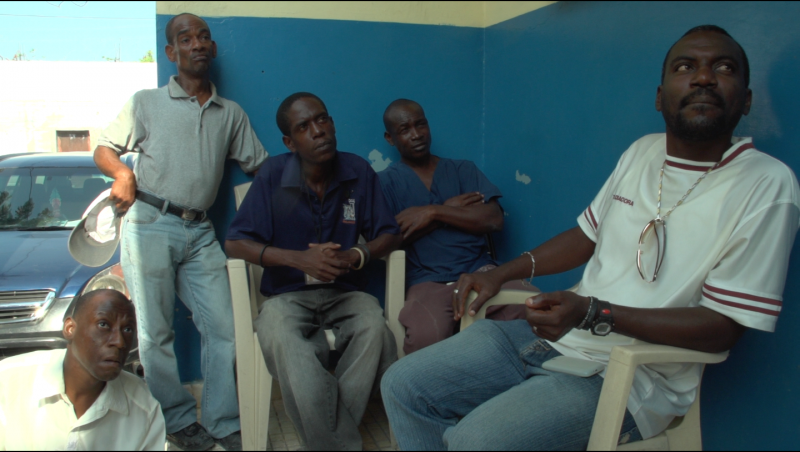
CESのスタッフ。写真は掲載許可済み。
GV: この映画の制作中で一番印象に残っていることや感動したことは何ですか? CESのためにこの映画がどのような役割を果たしてほしいですか?
LJ: Seeing the theatre troupe/clowns (Les Reskapés) work with CES students was mesmerising. We were deeply touched by the students’ transformation during the roleplaying and theatre exercises they did together. Almost immediately, they became brash and outgoing, excited and funny. It was inspiring to see the close bonds between the Reskapés and the students. We want to bring attention to the great work CES does on a daily basis, and help them raise money to support it.
LJ: CESの生徒たちとピエロ団(レ・レスカペ)の団員たちが一緒に活動している姿に目を奪われます。ロールプレイングや演技の練習をしている間、生徒たちの様子に変化があらわれ心から感動しました。団員たちと関わり始めてすぐに友好的な明るい表情を見せ、気持ちも高まり楽しそうにしていました。レ・レスカペの団員たちと生徒の間にできた強い絆を目にし、勇気をもらいました。CESが日々行っている素晴らしい活動に注目してもらい、資金集めにつなげられればと思います。
もし、CESのことをもっと知りたい、あるいはサポートしたいと思ってくださるなら、CES所長マリーズ・ジャン=ジャック(marysejj88@yahoo.fr)または、映画制作者のレナ・ジャクソン(lenaisabeljackson@gmail.com)に連絡をください。CESのウェブサイトもご活用ください。






